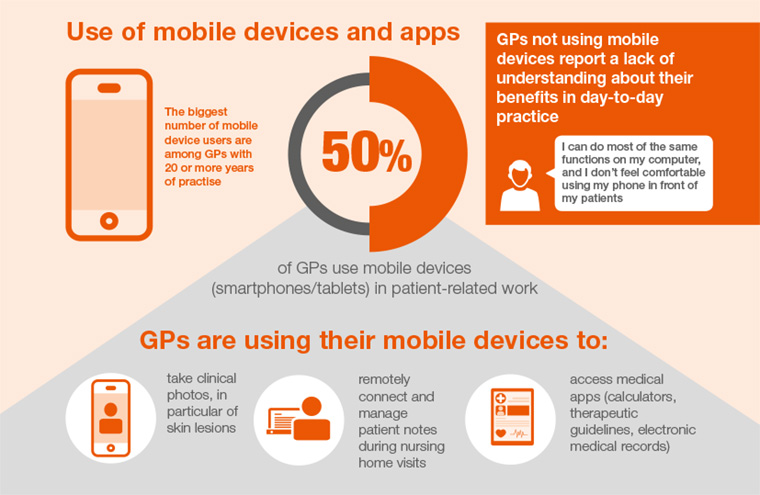News
Better healthcare through technology? Yes please, say GPs
A new RACGP technology survey looks to a future in which GPs can access clinical test results, medical records and drug references from their work devices.
 The survey found GPs with 20 or more years’ experience are more likely to use mobile devices for clinical work than their younger counterparts.
The survey found GPs with 20 or more years’ experience are more likely to use mobile devices for clinical work than their younger counterparts.
Close to 2000 GPs responded to the RACGP’s 2017 survey, ‘Views and attitudes towards technological innovation in general practice’.
Four out of five GPs surveyed by the RACGP are satisfied with the way they use technology in their practice.
There are several opportunities to use technology to streamline processes further, such as using more electronic referrals, using patient data in real-time decisions and communicating more effectively with patients and other medical professionals.
However, many feel that a paperless office is still not possible while specialists and larger health organisations still use fax machines and paper-trails. By contrast, only 15% of practices maintain a paper-based record system in addition to their electronic clinical systems.
GPs with 20 or more years of practice are more likely to use mobile devices for clinical work than younger GPs. Half the GPs surveyed used smartphones or tablets for direct patient-related work, such as taking images of skin lesions or accessing medical apps. Only a quarter of GPs regularly recommended apps to their patients. Those who did recommended mental health, fitness, nutrition and women’s reproductive health apps. The majority who did not cited a lack of knowledge and uncertainty about their usefulness.
Practices most commonly use technology to send text message reminders for appointments, provide commonly used forms on their websites, and make email and social media available, according to the survey results.
Almost three in four GPs surveyed shied away from using social media for work purposes despite its promotional benefits, wary of security concerns, confidentiality, the time required, and the potential to violate doctor–patient boundaries.

Infographic from ‘Views and attitudes towards technological innovation in general practice’.
Looking forward, the GP respondents anticipated being able to access clinical test results, medical records and drug references from their work devices.
The main enablers associated with technology adoption were learning and development opportunities, role-modelling from the practice manager, colleague examples and the availability of technology in the practice.
Common bugbears preventing uptake of more technology in practices included a lack of integration with existing IT systems and concerns around patient confidentiality and privacy.
ehealth mobile-health technological-innovation-in-general-practice technology-survey
newsGP weekly poll
Health practitioners found guilty of sexual misconduct will soon have the finding permanently recorded on their public register record. Do you support this change?